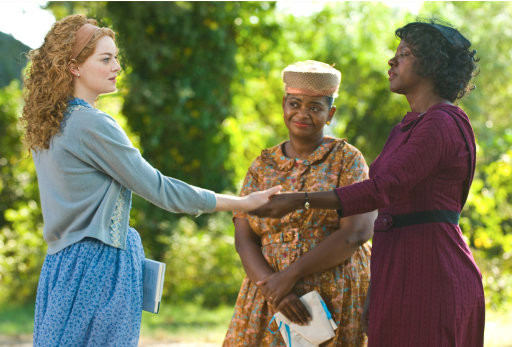The Help, a comedy-drama film set in the South during the turbulent mid-1960s, finished at the top of the U.S. movie box office for the second weekend in a row. Although the film

received largely positive reviews, a critic from the Boston Globe predictably lambasted the film for insufficient hatred of the American South:
It’s possible both to like this movie – to let it crack you up, then make you cry – and to wonder why we need a broad, if sincere dramatic comedy about black maids in Jackson, Miss., in 1962 and ’63 and the high-strung white housewives they work for. The movie is too pious for farce and too eager to please to comment persuasively on the racial horrors of the Deep South at that time.
But the critic, Wesley Morris, didn’t stop there. His biggest complaint is that the The Help shows black women of the era as needing help in order to reach their full potential in the Jim Crow South. The central character, a white female known as Skeeter (Emma Stone), he notes, “changes the lives of a couple of dozen black women whose change is refracted primarily through her.” Not good, Morris complains:
“The Help’’ joins everything from “To Kill a Mockingbird’’ to “The Blind Side’’ as another Hollywood movie that sees racial progress as the province of white do-gooderism.
What Morris fails to acknowledge is that an essential element of racial progress at that time was indeed the province of white do-gooderism. The ideas, philosophy, and admonitions of the great black writer and educator Booker T. Washington had been undervalued by whites and blacks alike during the Jim Crow era, and the evil of government-mandated racial segregation was allowed to fester. Concentrating solely on the much-needed quest for blacks’ political rights, many prominent U.S. black leaders adopted fashionable anti-market attitudes and failed to encourage the strengthening of black business, education, and personal development.
The countless American blacks who took Washington’s advice instead and worked hard to achieve success against the awful backdrop of Jim Crow are a good potential subject for laudatory film treatment, and I would greatly like to see such films be made. But even with all their hard work and heroic efforts at overcoming government-imposed racial mistreatment, these individuals had to wait for the nation’s white majority to acknowledge and remedy the outrageous ill-treatment by state governments in the American South. That fact is emblematic of one of the awful things about democracy, while foregrounding the immensely liberating character of free enterprise.
The fact that The Help brings to the fore this unpleasant truth about politics and the history of race relations in the United States is a good thing, in my view. Morris, however, wants films that deal with black people to serve a contemporary agenda of psychological self-empowerment. Thus black women, he argues, ought to be presented as the central figures and shown as heroines:
White boys have always been Captain America. Black women, in one way or another, have always been someone’s maid. These are strong figures, as that restaurant owner might sincerely say, but couldn’t they be strong doing something else?
In short, Morris argues, history be damned if it conflicts with his agenda.
Describing the novel on which the film was based as “sneaky,” Morris actually accuses the filmmakers of being the equivalent of slaveowners:
On one hand, it’s juicy, heartwarming, well-meant entertainment. On the other, it’s an owner’s manual.
I don’t suppose that such a statement requires any rejoinder at all.
